Posts Tagged ‘Burma Partnership’ (399 found)
Despite End-of-Year Amnesty, Political Prisoner Issue Casts Shadow Over 2014
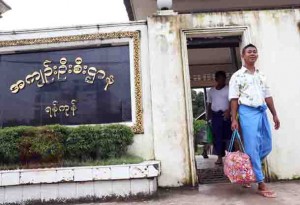 To casual Burma observers, President Thein Sein may appear to have fulfilled his promise to British Prime Minister David Cameron on 15 July 2013 that all political prisoners in Burma would be released by the end of 2013. After all, political prisoners were freed throughout 2013, culminating in two “final” releases on 11 December (41 released) and 31 December (16 released). The motive is not hard to discern: such high profile releases play into the current “good news” narrative on Burma. The international community, hungrily eyeing up Burma’s huge potential as an untapped frontier market of boundless investment opportunities, cheap labor and vast natural resources, tends to lap up such reports without examining the narrative more carefully.
To casual Burma observers, President Thein Sein may appear to have fulfilled his promise to British Prime Minister David Cameron on 15 July 2013 that all political prisoners in Burma would be released by the end of 2013. After all, political prisoners were freed throughout 2013, culminating in two “final” releases on 11 December (41 released) and 31 December (16 released). The motive is not hard to discern: such high profile releases play into the current “good news” narrative on Burma. The international community, hungrily eyeing up Burma’s huge potential as an untapped frontier market of boundless investment opportunities, cheap labor and vast natural resources, tends to lap up such reports without examining the narrative more carefully.
Inevitably the narrative is not so simple. The most prominent criticism of the Burma government’s policy towards political prisoners in 2013 was that it was releasing some, while all the time arresting others, particularly land and community activists. This “revolving door” policy ensured that Burma’s jails were in no danger of being put out of business […]
A Year of Nascent Reforms Taking Root, Challenges for Future Growth
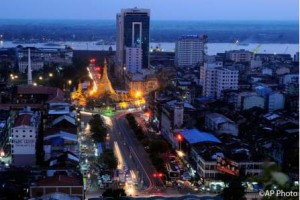 2013 has been a year in which many of the nascent reforms of 2012 have begun to take root, but also one in which new challenges have emerged. In 2014, there will be many opportunities for the government of Burma to show its commitment to democratic transition.
2013 has been a year in which many of the nascent reforms of 2012 have begun to take root, but also one in which new challenges have emerged. In 2014, there will be many opportunities for the government of Burma to show its commitment to democratic transition.
This year saw the historic meeting of ethnic armed groups in Laiza, Kachin State, with a second due in Karen State the third week of January. Despite such important conferences, the uncertainty of the ceasefire process has had an impact on ethnic unity. After several postponements, the government is planning to hold its nationwide ceasefire in early 2014. Such a public show will not be enough to solve decades of armed conflict and ethnic inequality; the government, its Union Peace Working Committee and all ethnic armed groups must engage in a comprehensive, inclusive political dialogue with all parties on an equal footing. An independent third party mediator would help ensure that the difficult underlying issues, such as the power of the Burma Army, political power sharing between the government and ethnic nationalities, resource management, and justice for human rights abuses committed by all sides, are finally addressed and sustainable peace is achieve […]
Japan’s Opportunity to Prove Itself a Responsible Investor in Burma
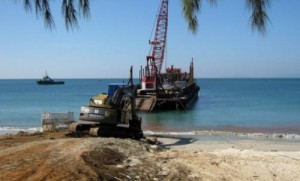 As Japan deepens its economic ties with Burma at the Japan-ASEAN summit in Tokyo, civil society from Tavoy, Tenasserim Region, express concerns over investing in a huge special economic zone that has already caused widespread human rights violations.
As Japan deepens its economic ties with Burma at the Japan-ASEAN summit in Tokyo, civil society from Tavoy, Tenasserim Region, express concerns over investing in a huge special economic zone that has already caused widespread human rights violations.
Adding to the US$867 million in loans pledged in May, Japanese Prime Minister Shinzo Abe promised a further US$578 million in loans for infrastructure development for the Thilawa Special Economic Zone (SEZ), as well as upgrading Burma’s railway network. Another agreement was made in which greater protections for Japanese businesses investing in Burma are established, thus creating a safer environment to explore business opportunities […]
Burma Uses Old Tactics to Silence the People
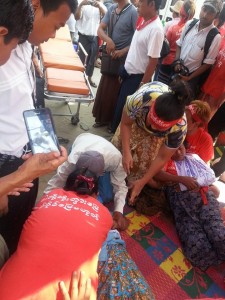 Enact a repressive law, use thugs to crackdown, arrest and imprison protesters – it’s a strategy that never gets old for the Burmese authorities.
Enact a repressive law, use thugs to crackdown, arrest and imprison protesters – it’s a strategy that never gets old for the Burmese authorities.
With the ongoing implementation of such a strategy, it has become more clear than ever that Burma does not tolerate critical voices that question the acts of the government or its cronies. The country has witnessed crackdowns and widespread and systematic arrests of peaceful demonstrators and activists throughout President Thein Sein’s term in office. Many of them have been charged under Article 18 of the Peaceful Assembly and Peaceful Procession Law, as well as Section 505 (b) of the Penal Code, and the number is growing every day.
The latest crackdown came on 7 December in Michaungkan Quarter of Thingungyun Township, Rangoon, where more than 200 protestors were demanding the return of land that they claimed was confiscated by the Burma Army in 1990, the time when protesting against the military regime was out of the question. At least 8 protestors were injured as a group of men in civilian clothes armed with batons who claimed to be “cleaning workers from the army” attacked the peaceful protestors. Since the protest started on 26 November, two protest leaders have been arrested and sentenced to three months in prison each. Township authorities have told the demonstrators to disband their protest site or face forceful removal […]
Call for an International Legally Binding Instrument on Human Rights, Transnational Corporations and Other Business Enterprises
We, the undersigned organisations, Concerned about the continuing abuses and violations of human rights occurring all over the world which directly or indirectly engage the responsibility of business enterprises; Concerned also that such abusive conduct often disproportionately impacts women, who comprise the majority of workers in the most vulnerable sectors, peasants, indigenous peoples, persons living […]
• •Cooperation Needed to End Violence Against Women of Burma
 To mark 25 November, the International Day for the Elimination of Violence Against Women, 27 civil society organizations have come together to launch 16 days of action that will end on 10 December, International Human Rights Day. The campaign began with a public ceremony in Rangoon on 24 November that included games, music and other performances. Women’s groups called for cooperation from all people of Burma to help end all forms of violence against women by participating in a “white campaign”, wearing white shirts or accessories during the 16 days to raise awareness about the problem of violence against women.
To mark 25 November, the International Day for the Elimination of Violence Against Women, 27 civil society organizations have come together to launch 16 days of action that will end on 10 December, International Human Rights Day. The campaign began with a public ceremony in Rangoon on 24 November that included games, music and other performances. Women’s groups called for cooperation from all people of Burma to help end all forms of violence against women by participating in a “white campaign”, wearing white shirts or accessories during the 16 days to raise awareness about the problem of violence against women.
In a Burmese-language statement, the Women’s League of Burma called for the people of Burma to work together to reduce the role of the military in the governance of the country and achieve sustainable peace. The statement outlined the many different forms of violence that women face on a daily basis: physical, mental, sexual, domestic and community violence, as well as violence carried out by the Burma Army, especially in ethnic nationality areas […]
Modern Slavery in Rangoon’s Industrial Zones
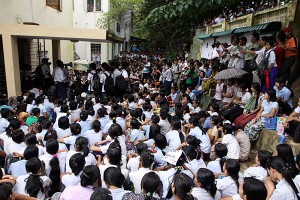 On 14 November, a group of labor organizations and unions released the English language version of ‘Modern Slavery: A Study of Labour Conditions in Yangon’s Industrial Zones 2012-2013’. The Burmese language version was released in Rangoon on 30 October. Research into the abysmal living and working conditions in the main industrial zones of Rangoon, including Hlaingtharyar, was undertaken by Labor Rights Clinic, Cooperation Programme of Independent Labourers, Construction-based Labour Union and Workers Support Group, as well as other labor unions and activists who wish to remain anonymous.
On 14 November, a group of labor organizations and unions released the English language version of ‘Modern Slavery: A Study of Labour Conditions in Yangon’s Industrial Zones 2012-2013’. The Burmese language version was released in Rangoon on 30 October. Research into the abysmal living and working conditions in the main industrial zones of Rangoon, including Hlaingtharyar, was undertaken by Labor Rights Clinic, Cooperation Programme of Independent Labourers, Construction-based Labour Union and Workers Support Group, as well as other labor unions and activists who wish to remain anonymous.
The report underscores the many challenges that workers face in their daily lives. The typical basic wage is around US$25-US$37 per month, leaving workers little choice but to work an average 11 hours per day, 6 days per week, just to make ends meet. Many, who fail to earn enough to cover their monthly living expenses, turn to pay-day lenders, thereby trapping them in a vicious cycle of debt. A complex system of bonuses, as well as the need for overtime, means that any time taken for sickness or holiday, anything other than 100% punctuality, or any perceived under-performance, means that employers can dock significant amounts of workers’ monthly wages. The report also finds that sanitation and health standards are generally inadequate, that many people live in dirty overcrowded, factory-provided hostels, that women face sexual harassment traveling to and from work, and that factory supervisors are often harsh and ruthless […]
• • •Investment at What Cost?
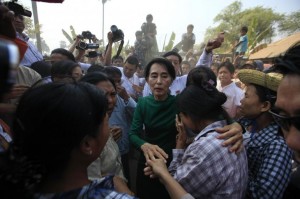 The re-engagement of Burma with the global, free market economy has created opportunities, hope and great potential. Yet with this re-engagement come significant pitfalls, human rights abuses and the legitimization of past abuses being two of the more serious. All foreign investment must be scrutinized and held to the highest standards in order to avoid either of the above mentioned dangers. Specifically, business ties to any cronies of the Burma Army or perpetrators of human rights abuses must not be tolerated and land confiscation associated with this increased business engagement must end.
The re-engagement of Burma with the global, free market economy has created opportunities, hope and great potential. Yet with this re-engagement come significant pitfalls, human rights abuses and the legitimization of past abuses being two of the more serious. All foreign investment must be scrutinized and held to the highest standards in order to avoid either of the above mentioned dangers. Specifically, business ties to any cronies of the Burma Army or perpetrators of human rights abuses must not be tolerated and land confiscation associated with this increased business engagement must end.
On 7 November, 37 civil society organizations sent a letter to President Barack Obama asking him to update the US Specially Designated Nationals list for Burma. The list is a US Treasury Department list of individuals and companies barred from having financial or business ties to the United States. These individual and companies were barred due to their ties to the military regime, serious human rights abuses, corruption and the selling of weapons to North Korea. This list has remained basically unchanged since 2009; this is despite the ongoing corruption in the country and the very serious human rights violations that have occurred. The US itself acknowledges that the list is out of date, as evidenced by diplomatic cables leaked in 2009 where the US embassy in Rangoon noted that “many of the real perpetrators of human rights abuses or those who provide significant support to the regime are not yet targeted.” An updating of the list and a systematic way of adding and removing names are of immediate importance. To date the US government has been more concerned with establishing economic ties and a revised list could cause complications for US businesses. This is a sad state of affairs when economic interests trump basic human rights […]
• • •Endemic Land Confiscation in Burma: A Major Challenge to the Reform Process
The issue of land confiscation has been and will continue to be one of the largest problems facing Burma. The increase in foreign investment, the liberalization of the economy, and lack of rule of law generally, including both appropriate legislation and an independent judiciary,have resulted in land confiscation on an endemic scale. Thegovernment of Burma has responded […]
• • •Nationwide Ceasefire Accord: Not the End Game
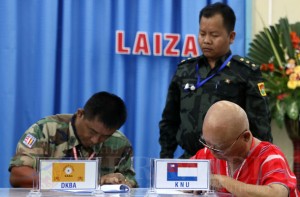 At a historic summit in Laiza, Kachin State, 17 ethnic non-state armed groups agreed to sign the government proposed nationwide ceasefire accord on condition that political dialogue will follow. Of the armed groups who attended this conference, the Restoration Council for Shan State (RCSS) were the only group not to sign, stating that they wanted to consult with Shan political parties and civil society before agreeing.
At a historic summit in Laiza, Kachin State, 17 ethnic non-state armed groups agreed to sign the government proposed nationwide ceasefire accord on condition that political dialogue will follow. Of the armed groups who attended this conference, the Restoration Council for Shan State (RCSS) were the only group not to sign, stating that they wanted to consult with Shan political parties and civil society before agreeing.
A 13-member committee has been formed that will lead negotiations with government minister Aung Min’s peace team in Myitkyina, the capital of Kachin State, starting on 4 November. The conditions to be negotiated with Aung Min include a guarantee that comprehensive political dialogue will be held early next year that will address the role of the Burma Army and greater autonomy for Burma’s ethnic nationalities, something for which they have been fighting for decades.
The 3-day summit was held in Laiza, a town in Kachin Independence Organization (KIO) held territory. Ethnic leaders were greeted by hundreds of supporters on the streets of the town, cheering and singing songs as various leaders arrived. It is of no surprise that ethnic armed groups garner this kind of support. As the summit was being held, Burma Army forces attacked villages in southern Kachin State, displacing around 2,000 people and causing one woman, who was already in bad health, to die while she was sheltering in a church. Burma Army soldiers reportedly opened fire as they entered the five villages under attack […]









 All posts
All posts